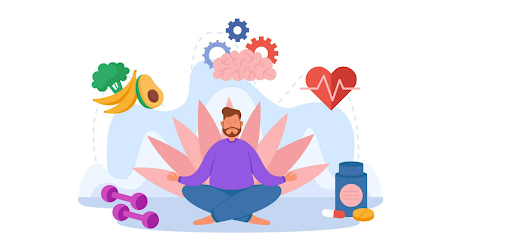Self-care goes beyond pampering—it’s about creating sustainable practices that nurture your mind, body, and soul. Incorporating healthy lifestyle routines into your daily life enhances energy levels and fosters mental health healing, helping you build resilience against life’s challenges.

The five most effective self-care habits are:
These simple lifestyle changes boost energy, improve focus, and support mental health healing. Let’s look at how you can apply them in your daily life—especially if you’re a student or young professional facing constant pressure.
Movement is one of the easiest ways to feel better—both physically and mentally. Exercise:
How to Start: Begin with 20–30 minutes of movement daily. A brisk walk, yoga session, or even dancing in your room counts.
Self-Care Tip: Pick an activity you enjoy—it’s easier to stay consistent when it feels fun, not forced.
Mindfulness helps you stay grounded and calm, especially during stressful times. It can be practiced through:
How to Start: Dedicate 5 minutes each morning to deep breathing or guided meditation. Gradually increase as it feels comfortable.
Self-Care Tip: Use simple cues—like pausing before meals to take three slow breaths—to bring mindfulness into daily life.
Added Insight: Mindfulness activates areas of the brain linked to emotional regulation and calm. It helps you respond thoughtfully rather than react impulsively during stressful moments.
The food you eat fuels both the body and brain.
How to Start: Add one healthy food swap daily—like choosing fruit over chips or whole grains over refined carbs.
Self-Care Tip: Plan meals to avoid quick, processed options. Include foods rich in omega-3s and probiotics for brain and gut health.
Sleep is not optional—it’s essential. It supports memory, emotional balance, and physical repair. Poor sleep can increase stress, lower focus, and even affect appetite.
Ways to improve sleep:
How to Start: Go to bed and wake up at the same time each day—even on weekends. Aim for 7–9 hours of rest.
Self-Care Tip: Create a bedtime ritual—dim lights, stretch, or read—to signal your body it’s time to wind down. Limit screens an hour before bed.
Added Insight: Quality sleep restores memory, supports emotional balance, and repairs the body. Lack of sleep disrupts appetite hormones and raises risks of anxiety and depression.
Strong relationships are a key part of self-care. Supportive connections:
How to Start: Schedule regular check-ins with friends or family—whether a weekly call, study group, or coffee meetup.
Self-Care Tip: Join a community or hobby group if you’re looking to meet new people. Shared interests often create meaningful connections.
If you’re spending more time indoors, try:
These small actions create moments of calm and emotional strength.
Takeaway
Self care habits aren’t selfish; they are essential.
Start small, with one or two habits, and build from there. Whether it’s a short walk, a gratitude journal, or setting a regular sleep schedule, each step is an investment in your future health and happiness.
Prioritize your well-being today. A healthier, balanced you is the best gift you can give yourself.
How do I start practicing self care if I feel overwhelmed?
Start with one small habit—like drinking more water, stretching for 5 minutes, or setting a bedtime. Trying to change everything at once can lead to frustration.
Which self care habits are best for students?
Can self care habits replace therapy or professional help?
No. Self care supports your well-being but is not a substitute for professional care. If you’re struggling, reach out to a mental health professional.
How long before I see results from self care?
Some benefits—like stress relief from exercise—are immediate. Others, like improved sleep quality or mood stability, may take a few weeks of consistency.
How can I stick to self care habits?
Set reminders on your phone
Pair new habits with existing routines (e.g., stretch after brushing teeth)
Start small, then increase gradually
Track your progress in a journal or app
What self care habits reduce anxiety fast?